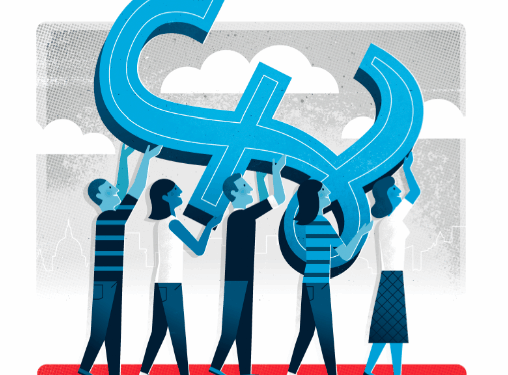The best case for the welfare state is people are entitled to resources where they truly need them. No one should be left to starve; both communists and classical liberals agree. However, beyond meeting basic needs, the welfare state becomes a lot more questionable. A starving man might be entitled to take an apple pie off someone’s windowsill, but a man who can afford all his basic needs is hardly entitled to take money off the rich man to pay for his own leisure. Yet today this is precisely what the welfare state overwhelmingly does. It must stop. Universal Credit in particular must be slashed by up to 70 per cent in the budget to stop taxes financing leisure.
The bottom decile of non-retired households have a disposable income of £15,962. This is made up of £19,914 of gross income of which £10,829 is from work and private sources with the remaining 46 per cent, £9,084, coming from state benefits. 69 per cent of the benefits come from Universal Credit, tax credits, child benefit and housing benefit.
Although their disposable income is paltry, the welfare state ends up financing a great number of their pleasures. Figures for the similar group of the bottom decile of all households by income shows they spend 17 per cent of it, or, £2,397.20, on recreation and culture, hotels and restaurants, alcohol and tobacco along with chocolates, sweets, ice cream and soft drinks.
Should we accept the welfare state is only for meeting need, then, the above shows they can be massive cuts to many benefits. The poor man who can afford his basic needs shouldn’t take £200 out of a rich man’s wallet to finance his Sky sports subscriptions and takeaways, so, analogously, neither should the poor man get the state to take £200 out of a rich man’s wallet via taxation to do the same thing.
Let’s do a back-of-an-envelope calculation to see how much could be saved by not financing their leisure. If Universal Credit were cut by 71 per cent, corresponding to the £2,379.20 of leisure of the bottom decile, meaning, they’d have no leisure spending, but all other deciles would have some, a grand total of £37 billion could be saved every year. This would put a massive dent in the deficit of £137bn.
Admittedly working from averages with back-of-an-envelope calculations will mean a uniform reduction in Universal Credit would perhaps impoverish some, but then cuts could easily be made to high earners’ benefits to make up for a non-uniform reduction. Why, for example, does the median non-retired household, despite earning £56,345 in private income, receive a total of £5,649 in benefits; £3,689 excluding the state pension and personal independence payments.
Getting rid of all of those benefits for wealthy households would more than make up for meeting the genuine needs of the very poor who may suffer from a uniform cut to Universal Credit. And if poorer people still want money for leisure they can work longer hours: In 2023 the bottom decile were earning only half the minimum wage.
Cutting benefits would encourage people to be the best versions of themselves too. Instead of scrolling social media, waking up at an indecent hour, and, generally wasting away on the sofa, individuals would have to apply their intelligence or physical strength in a full-time job. As Samuel Smiles once wrote: ‘The spirit of self-help is the root of all genuine growth in the individual’.
A staggering 25 per cent of adults of working age are economically inactive and instead morally decay in a state of dependency on the productive class: People on Universal Credit do this to a lesser extent too. In today’s political climate this means the richest are overwhelmingly burdened; indeed, the top ten per cent of earners pay 59 per cent of income tax. And it is an iron law of social reality – a constant cause and effect relation – that taxing these great minds results in less of their fantastic effort and innovation that leads to our long-term prosperity. We’re all worse off due to moochers.
Some people will complain taking away benefits for those just above poverty will increase the taper rate, currently 55 per cent, to such a great extent nobody will choose to work full time, meaning, people will be stuck on benefits on minimum hours. An obvious solution is simply to require those who can work, to work full time to finance all their spending, and, to remove the benefits from them if they don’t. To quote Lenin: ‘He who does not work shall not eat’. Some people will claim families won’t be able to pay rent. Maybe. Such families should work longer, combine together in one house to half their rent, or, simply not have kids in the first place. None of us would accept students demanding a flat of their own if they couldn’t afford one, parents should be treated no differently.
The benefits class might ask why they shouldn’t have their Sky sports subscription and takeaways subsidised by the productive class. My first response is to say: ‘How dare you!’ My second response is this. The natural principle of human respect dictates individuals should be free to do as they please with their own person and legitimate holdings. Only by adhering to it is a proper harmony of people ensured where none are used as the simple tools for the achievement of others’ ends. Each is an ultimate end in themselves. Theft and violence always disrupt this proper harmony. Always. State action is no exception: Theft is taking a person’s property without their consent; taxation takes a person’s property without their consent; therefore, taxation is theft.
A sophisticated opponent of this libertarianism will question whether the pretax income of people is rightfully their private property in the first place. Political theorists such as John Rawls and G.A. Cohen will argue the rich are not entitled to their income because it is sheer brute luck they were born with favourable genetic features such as intelligence and to family circumstances which nurtured hard work.
Whether the creation of a resource has arisen out of sheer luck or not is irrelevant to who owns it. A miner who strikes a rich seam of tin through sheer luck and brings it up is fully entitled to the sweat of his brow. A farmer who tils a far greater quantity of land via hand simply due to the strong build he was born with is entitled to all the grain he has grown. Creators are fully entitled to the fruits of their labour.
The majority of the British people would certainly not want to see the full extension of the egalitarian argument to the global redistribution of wealth from those of us lucky enough to be born in Europe to those unluck enough to be born in Africa. Nor would people accept forced organ redistribution from the healthy to the sick. Even extreme need must give way to respecting person and property.
Many readers will agree with my moral evaluation of the welfare state, but despair at the prospect of anything being done. To get things done, I believe we need to divide society between the benefits class and the productive class. The benefits class is constituted by those individuals who receive more in cash benefits than they pay in direct taxes; today the bottom three deciles of households are in it. A further division can then be made within the benefits class between those who we should have sympathy for and those we should not. We should have sympathy with the physically disabled, widows with children, and, faultlessly poor pensioners. We should not have sympathy with the feckless people who choose not to work, fail to save for retirement, and, lounge about all day. These people should be shunned.
Today the second group of the benefits class make up a huge proportion of the population, hence, politicians are petrified of saying ‘no’ to them. 8 million people are on Universal Credit and 5.6 million are on out of work benefits. Again, 25 per cent of working age people are economically inactive. Many of them due to dubious mental health conditions which have exploded since the pandemic, indeed, since 2019 over half of the rise in disability benefit cases are due to mental health. As I’ve outlined elsewhere, people on benefits should all be on a register which people can easily check up on so as to ensure the system is not being cheated.
The Taxpayers’ Alliance finds that since the pandemic the number of people with autism, anxiety or depression receiving the enhanced rate of personal independence payments (a contradiction since to be on benefits is to be dependent), i.e., £110.40 per week for daily living compared to £73.90 for the standard rate, has exploded by over 150,000. Another very clear example of people taking the mickey is the 63,000 students who went straight from full time education to being economically inactive due to long term sickness. If they could sit at a desk and write an essay on gender relations in Peru, why can’t they work in a human relations department?
Universal Credit must be slashed in the budget to stop the benefits class from ripping off the productive class; capitalists and workers are fully entitled to the fruits of their labour. While a plausible case can be made for supporting the needs of the faultlessly poor, the welfare state does far more than just that, supporting the bottom decile of non-retired households spending 17 per cent of their income on leisure. No. If the benefits class want to go out to restaurants, drink beer and go on holiday they should pay for it themselves, just like the rest of us do.


![Scott Bessent Explains The Big Picture Everyone is Missing During the Shutdown [WATCH]](https://www.right2024.com/wp-content/uploads/2025/11/Scott-Bessent-Explains-The-Big-Picture-Everyone-is-Missing-During-350x250.jpg)






![Florida Files Supreme Court Case After Illegal Immigrant Truck Driver Kills Three [WATCH]](https://www.right2024.com/wp-content/uploads/2025/10/Florida-Files-Supreme-Court-Case-After-Illegal-Immigrant-Truck-Driver-350x250.jpg)







